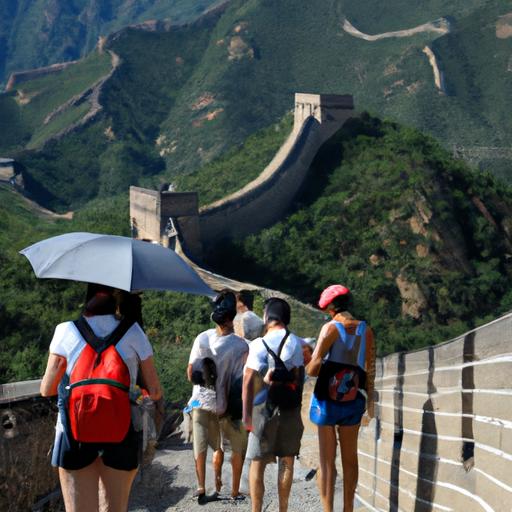Introduction
Traveling can be an exhilarating experience, filled with new adventures and unforgettable memories. However, have you ever wondered about the potential impact of traveling on your menstrual cycle? Understanding how travel can affect your period is crucial for maintaining your overall well-being while on the go. In this article, we will delve into the intricate relationship between traveling and menstrual health, exploring the various factors that can influence your cycle along the way.
Why is it Important to Understand the Impact of Traveling on the Menstrual Cycle?
As women, our menstrual cycle is an essential part of our reproductive health. It is influenced by a delicate balance of hormones and can be indicative of our overall well-being. Therefore, any disruptions to our menstrual cycle can raise concerns and affect our physical and emotional state. By understanding how traveling can impact our periods, we can better manage our menstrual health and make informed decisions while embarking on new adventures.
Unveiling the Main Keyword: “does traveling affect period“
The main keyword, “does traveling affect period,” encapsulates the core inquiry we aim to address in this article. We will dive deep into the potential effects of travel on the menstrual cycle, exploring factors such as changes in time zones, stress, climate variations, and more. By shedding light on this topic, we aim to provide clarity and knowledge that will empower you to navigate your menstrual cycle confidently while exploring the world.
Now that we have set the stage, let’s embark on this intriguing journey together, exploring the intricate relationship between traveling and our menstrual health.
Understanding the Menstrual Cycle
Explanation of the Menstrual Cycle and Its Phases
To comprehend the impact of traveling on menstrual health, it is essential to understand the menstrual cycle itself. The menstrual cycle refers to the monthly hormonal changes that occur in a woman’s body, preparing it for potential pregnancy. It typically lasts around 28 days, although variations are common.
The menstrual cycle consists of four phases: the menstrual phase, follicular phase, ovulation, and luteal phase. During the menstrual phase, the uterus sheds its lining, resulting in menstruation. The follicular phase follows, characterized by the development of follicles in the ovaries and the thickening of the uterine lining. Ovulation occurs when a mature egg is released from the ovary, ready for fertilization. Finally, the luteal phase begins after ovulation, during which the uterus prepares for possible pregnancy.
Normal Variations in Menstrual Cycle Length and Characteristics
It is important to note that the length and characteristics of the menstrual cycle can vary widely among individuals. While the average cycle lasts 28 days, it is considered normal for cycles to range between 21 and 35 days. Similarly, the duration and flow of menstruation can also vary. Factors such as age, hormonal changes, stress, and underlying health conditions can contribute to these variations.
Factors That Can Potentially Influence the Menstrual Cycle
Several factors can impact the regularity and characteristics of the menstrual cycle. Hormonal imbalances, such as polycystic ovary syndrome (PCOS) or thyroid disorders, can cause irregular periods. Stress, both physical and emotional, can disrupt hormone production and lead to menstrual irregularities. Additionally, changes in weight, excessive exercise, and certain medications can also affect the menstrual cycle.
Understanding the complexities and variations of the menstrual cycle is crucial when examining the potential influence of traveling on the period. By grasping the normal range of menstrual cycle lengths and the factors that can influence it, we can now explore how travel might impact this delicate balance.
Traveling and Its Effects on the Menstrual Cycle
Impact of Changes in Time Zones and Jet Lag on the Menstrual Cycle
Traveling across different time zones can wreak havoc on our internal body clock, also known as the circadian rhythm. Our menstrual cycle is intricately linked to this internal clock, and sudden changes can lead to disruptions. Jet lag, caused by rapid travel across time zones, can affect the regularity, duration, and intensity of our periods. The abrupt shift in daylight exposure can confuse our bodies, altering hormonal balance and potentially leading to irregular cycles.
Influence of Stress and Anxiety Related to Travel on Menstrual Regularity
Let’s face it, traveling can sometimes be stressful. From the hustle and bustle of airports to the uncertainties of navigating new destinations, stress and anxiety can become unwelcome companions on our journeys. These emotional strains can impact the hypothalamus, a region of the brain crucial in regulating our menstrual cycle. Elevated stress levels can disrupt the release of hormones, leading to irregular or missed periods. It is essential to find ways to manage stress while traveling to support our menstrual health.
Disruption of Daily Routines and Its Impact on the Menstrual Cycle
When we travel, our daily routines often go out the window. We may experience changes in sleep patterns, meal schedules, and exercise routines. This disruption can impact our menstrual cycle, as our bodies thrive on consistency and routine. Irregular sleeping patterns, inadequate nutrition, or a lack of physical activity can throw off the delicate hormonal balance, potentially causing changes in the duration and regularity of our periods.
Effects of Climate and Environmental Changes on Menstruation
Traveling often exposes us to different climates and environmental conditions. Extreme temperatures, humidity levels, and altitude changes can affect our bodies in various ways, including our menstrual cycle. Some women may experience alterations in the length, flow, or symptoms associated with their periods when exposed to significant climate variations. It’s important to listen to our bodies and adapt to these changes by staying hydrated, dressing appropriately, and taking necessary precautions to support our menstrual health.
Now that we have explored the diverse effects of traveling on the menstrual cycle, we can better understand the potential impact of our adventures on our periods. In the next section, we will delve into expert opinions and scientific studies to gain further insights into this intriguing topic.
Expert Opinions and Studies
A. Insights from Medical Professionals and Researchers on the Topic
When it comes to understanding the impact of traveling on the menstrual cycle, medical professionals and researchers have provided valuable insights. Gynecologists and endocrinologists, well-versed in the intricacies of reproductive health, offer expert opinions on how travel can affect periods. Their knowledge and experience help shed light on the potential mechanisms behind these disruptions.
Medical professionals suggest that changes in time zones and disrupted sleep patterns during travel can influence the body’s internal clock, known as the circadian rhythm. This disruption may affect hormone regulation, potentially leading to irregularities in the menstrual cycle. Additionally, stress and anxiety related to travel can trigger hormonal imbalances, causing changes in the duration and intensity of periods.
B. Review of Scientific Studies Exploring the Relationship between Traveling and Menstrual Cycle Disruption
To further comprehend the connection between traveling and menstrual health, numerous scientific studies have been conducted. These studies explore the impact of various travel-related factors on the menstrual cycle, providing valuable insights into the potential disruptions.
Research has demonstrated that long-haul flights and frequent travel across time zones can lead to menstrual irregularities in some individuals. Studies have also indicated that women who frequently travel for work may experience more significant menstrual cycle disturbances compared to those who travel occasionally. Environmental changes, such as shifts in temperature and humidity, have also been linked to alterations in menstruation patterns.
C. Summary of Findings and Conclusions from Relevant Research
The culmination of these studies and expert opinions has provided a comprehensive understanding of how traveling affects the menstrual cycle. While individual experiences may vary, the research suggests that travel can indeed disrupt periods. It is important to note that not all women will experience significant changes, but being aware of the potential impact can help manage expectations and take proactive measures.
By summarizing the findings and conclusions from relevant research, we gain a clearer picture of the relationship between travel and menstrual cycle disruption. Armed with this knowledge, we can now explore practical tips and strategies for managing menstruation while embarking on exciting journeys.
Tips for Managing Menstruation while Traveling
Traveling should never hinder your ability to manage your menstrual cycle effectively. To ensure a smooth journey, here are some helpful tips to consider:
A. Suggestions for Maintaining Menstrual Hygiene on the Go
When it comes to menstrual hygiene, being prepared is key. Consider the following suggestions:
- Pack an ample supply of sanitary products, such as pads, tampons, or menstrual cups, to last throughout your trip. It may be challenging to find your preferred brand or product in unfamiliar locations.
- Carry a small waterproof pouch or bag to discreetly store used sanitary items until you can properly dispose of them.
- If you prefer using menstrual cups, ensure you have access to clean water and sanitary facilities for proper cleaning and sterilization.
B. Strategies for Dealing with Menstrual Pain and Discomfort during Travel
Menstrual pain and discomfort can put a damper on your travel plans. Here are some strategies to manage them effectively:
- Pack pain-relief medications like ibuprofen or naproxen to alleviate menstrual cramps. However, consult with your healthcare professional before taking any medication.
- Apply a heating pad or use heat patches to soothe abdominal cramps, even while on the move.
- Engage in light exercises or stretches to help relieve muscle tension and promote blood flow, which may alleviate discomfort.
C. Importance of Packing Essential Supplies and Medications
Don’t underestimate the significance of packing essential supplies and medications to maintain your menstrual health while traveling. Consider the following:
- Carry extra underwear and spare clothes in case of any unforeseen leaks or accidents.
- If you use hormonal contraceptives, ensure you have an adequate supply to last the duration of your trip.
- If you have a pre-existing medical condition related to your menstrual cycle, consult with your healthcare provider before traveling to ensure you have the necessary medications and information.
D. Advice on Maintaining a Healthy Lifestyle to Support Menstrual Regularity while Traveling
Maintaining a healthy lifestyle can contribute to regular menstrual cycles, even while traveling. Here are some recommendations:
- Prioritize a balanced diet rich in nutrients, such as fruits, vegetables, and whole grains, as it can positively impact your menstrual health.
- Stay hydrated by drinking plenty of water throughout your journey to support overall well-being.
- Aim for regular exercise, even if it’s a short walk or stretching session, to mitigate the impact of travel-related stress on your menstrual cycle.
By following these tips, you can confidently manage your menstrual cycle while embracing the joys of travel. Remember, a little preparation and self-care go a long way in ensuring a smooth and enjoyable journey.
Conclusion
Throughout this article, we have ventured into the realm of understanding the impact of traveling on the menstrual cycle. We have explored the potential effects of changes in time zones, stress, and environmental factors on our periods. By delving into this topic, we have gained valuable insights that can help us maintain our menstrual health while on the go.
It is evident that traveling can indeed affect our menstrual cycle. Disruptions to our daily routines, exposure to different climates, and the stress associated with travel can all play a role in menstrual irregularities. However, it is essential to remember that every woman’s experience may vary, and individual factors can also contribute to these changes.
To manage our menstrual health while traveling, there are several key considerations. Maintaining menstrual hygiene, being prepared with essential supplies, and practicing self-care are all crucial aspects to keep in mind. Additionally, adopting a healthy lifestyle that includes proper nutrition, exercise, and stress management can provide support to our menstrual regularity.
As we conclude this journey, it is important to recognize that further research and understanding of the topic are needed. Menstrual health is a complex and multifaceted aspect of our well-being, and its relationship with travel is just one piece of the puzzle. By staying informed and in tune with our bodies, we can navigate our menstrual cycles confidently, embracing the wonders of travel while prioritizing our health.
Remember, every woman’s experience is unique, and it is essential to listen to your body and seek professional advice if needed. So, embrace your wanderlust, embark on new adventures, and let the world be your playground, all while staying mindful of your menstrual health. Safe travels!
*Note: The information provided in this article is for educational purposes only and should not replace professional medical advice.



